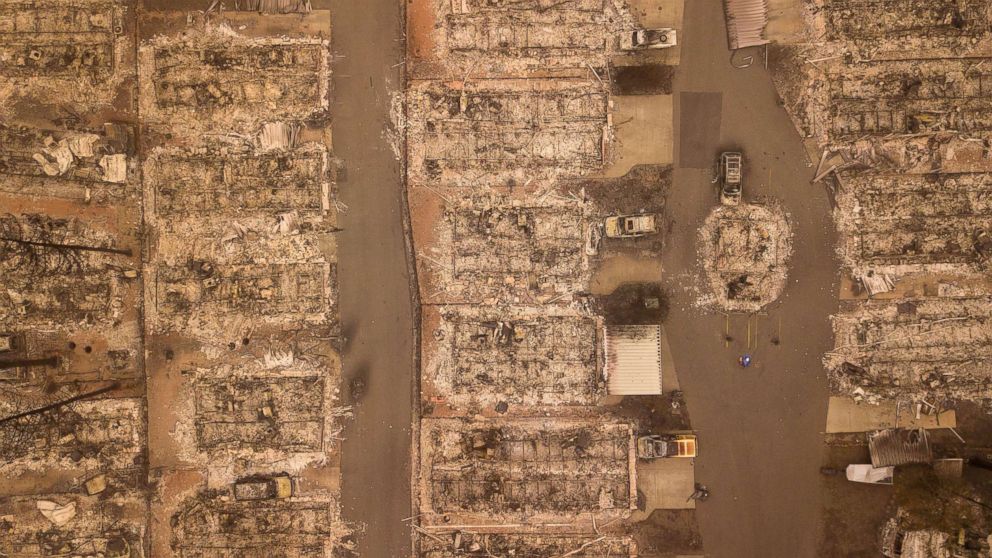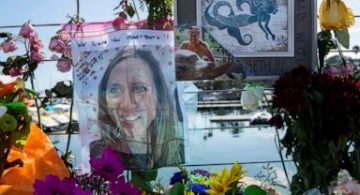
After more than two weeks of catastrophic infernos that indiscriminately devoured thousands and thousands of homes and structures and claimed scores of lives, both of California’s wildfires are now almost completely contained.
Late Saturday night, Northern California fire officials reported that the devastating Camp Fire in Butte County is 98 percent contained, just days after their counterparts in Southern California pronounced the Woolsey fire that tore through Malibu and other areas is 100 percent fully-contained.
To date, the Camp Fire has destroyed 13,954 residences, 514 commercial and 4,265 other buildings, according to the latest incident report. The northern blaze killed 84 people and injured three firefighters.
The Woolsey Fire also injured three other firefighters, claimed three lives, and destroyed more than 1,600 structures, according to the latest incident report for that fire.
In all, the pair of wildfires laid waste to a total area of nearly 400 square miles, according to the California Department of Forestry and Fire Protection. Officials said that the remains of at least 54 people have been positively identified so far.
The vast majority of the deaths — 84 in total — were due to the Camp Fire, the deadliest and most destructive wildland fire in the state’s history.
The number of people missing or unaccounted for in Butte County was down to 475 on Friday evening after having reached 605 on Thursday, according to the Butte County Sheriff’s Office. The number is expected to continue fluctuating as officials account for residents.
“We haven’t taken the day off,” Butte County Sheriff Kory Honea said in a video message on Thanksgiving Day.
There were 820 people in the field continuing search and rescue efforts on Thursday, as well as over 100 law enforcement officers protecting the areas that have been evacuated due to the Camp Fire, according to Honea.
A multi-agency task force, at the request of the Butte County Sheriff’s Office, has captured detailed aerial imagery maps of damaged properties in most of the burn areas in the town of Paradise, as well as video surveys and 360-degree drone panoramas of all major roads in the area, according to the sheriff’s office.
Officials hope the maps will provide valuable information to the search and recovery teams on the ground, multiple agencies coordinating response and to the residents of the community impacted by the Camp Fire.
“This has been a tough situation for all of us,” Honea said in his video message Thursday. “We’re in this together. We are Butte County strong.”
Much-needed rain doused the scorched areas on Friday and Saturday, though the heavy rain did bring new dangers to the burn scar areas in the form of flash floods and mudslides.
The National Weather Service had issued a flash flood watch for the burn areas in Northern California.
Here is more about the fires that have been devastating Northern and Southern California.
The Camp Fire in Northern California
The Camp Fire ignited Nov. 8 near Pulga, a tiny community in Butte County nestled in the Plumas National Forest. The blaze exploded as strong winds fanned the flames southwest, enveloping Paradise, a bucolic community of 27,000 people in the Sierra Nevada foothills.
The fire has virtually decimated the entire town.
Melissa Schuster, a Paradise town council member, said her house was among those leveled by the Camp Fire. “Our entire five-member council is homeless,” Schuster said in a Nov. 13 interview on ABC News’ “Start Here” podcast. “All of our houses have been destroyed.”
The death toll from the Camp Fire increased to 84 on Thursday, after officials found still more bodies in the burned-out rubble of homes and melted cars, according to the Butte County Sheriff’s Office, which has warned that the remains of some of the missing may never be recovered due to the severity of the fire. Thom Porter, chief of strategic planning for the California Department of Forestry and Fire Protection, said the body count is expected to climb higher as search crews continue sifting through the destruction.
“It is by far the most deadly single fire in California,” Porter has said of the Camp Fire.
Many of the deaths occurred in Paradise.
“The entire community of Paradise is a toxic wasteland right now,” Schuster said on Nov. 13, holding back tears.
“In addition to that, and this is the hardest part for me to even talk about, the number of fatalities is [among] things that we don’t know at this moment and that’s something that has to be determined before people can move back in.”
Two prison inmate firefighters were among a total of three firefighters who have been injured while battling the Camp Fire, officials told ABC News.
Last week, Gov. Brown toured the devastation caused by the Camp Fire along with Brock Long, administrator of the Federal Emergency Management Agency (FEMA), as well as U.S. Interior Secretary Ryan Zinke.
“This is one of the worst disasters I’ve ever seen in my career, hands down,” Long told reporters at the scene Nov. 14.
The Woolsey Fire in Southern California
The Woolsey Fire also ignited Nov. 8 near the city of Simi Valley in Ventura County and rapidly spread south to Los Angeles County. The wind-driven flames jumped the 101 Freeway before sweeping through the celebrity enclaves of Malibu and Calabasas.
The entire city of Malibu and a sprawling naval base near the seaside city of Oxnard were among the areas under mandatory evacuation orders, as officials warned the blaze could potentially spread all the way to the Pacific Ocean.
Evacuation orders have since been lifted for some areas, including parts of Malibu, as firefighters successfully stretched containment levels.
The Woolsey Fire, which torched a total of 96,949 acres in Ventura and Los Angeles counties, was fully contained by Wednesday night, according to the California Department of Forestry and Fire Protection.
In all, 1,500 structures were destroyed and another 341 have been damaged.
The blaze burned down a portion of Paramount Ranch in Agoura Hills known as “Western Town,” where hundreds of movies and television shows, including
HBO’s “Westworld,” have been filmed, dating back to the 1920s.
The Woolsey Fire has been blamed for the deaths of at least three people, and three firefighters sustained injuries while battling the flames, according to the California Department of Forestry and Fire Protection.
A public health emergency
U.S. Health and Human Services Secretary Alex Azar has declared a public health emergency in California, where the wildfires forced the evacuation of at least two hospitals and eight other health facilities.
“We are working closely with state health authorities and monitoring the needs of healthcare facilities to provide whatever they may need to save lives and protect health,” Azar said in a Nov. 14 statement. “This declaration will help ensure that Americans who are threatened by these dangerous wildfires and who rely on Medicare, Medicaid and the Children’s Health Insurance Program have continuous access to the care they need.”
The smoke from the flames descended across the Golden State and choked the air in major cities.
Smoke advisories were issued for the affected region amid concerns that smoke from the fires could present a “significant health threat” for people with asthma and other lung conditions, according to the U.S. Department of Health and Human Services. Residents were advised to stay indoors as much as possible and to wear a protective mask when venturing outside.
Berkeley Earth, a California-based nonprofit that analyzes air quality in real-time, ranked San Francisco, Stockton and Sacramento as the world’s three “most polluted cities” on Nov. 16.
Meanwhile, there has been an outbreak of norovirus at a shelter in Butte County housing evacuees, according to Lisa Almaguer, public information officer for Butte County Public Health.
People who are ill at the shelter have been taken to a separate location, are using separate restroom facilities and are being cared for by public health experts, according to Almaguer, who said the presence of the contagious virus is “not uncommon,” especially at this time of year and “with hundreds of people living in close quarters.”
President Trump tours unprecedented devastation
President Donald Trump arrived in California on Nov. 17 to survey the scene of surreal devastation and meet with firefighters, alongside California Gov. Jerry Brown and the state’s governor-elect, Gavin Newsom.
The president stopped first in the town of Paradise, where he called the damage “total devastation.”
“We’ve never seen anything like this in California, we’ve never seen anything like this yet. It’s like total devastation,” Trump told reporters. “I think people have to see this really to understand it.”
The president later visited Malibu to tour the destruction from the Woolsey Fire.
Trump pledged federal assistance to California following his visit, just days after he threatened to withhold funds from the state due to what he described as “gross mismanagement of forests.”
ABC News’ Karine Hafuta, Marilyn Heck, Julia Jacobo and Bonnie McLean contributed to this report.





